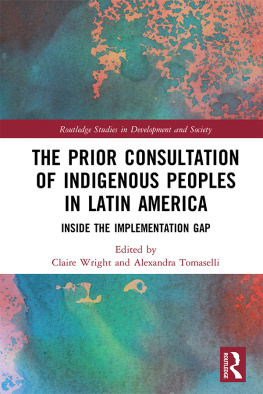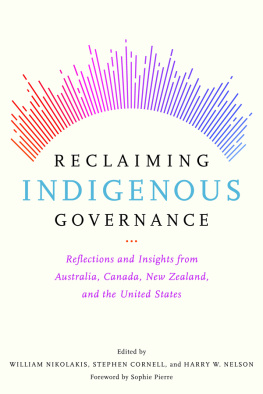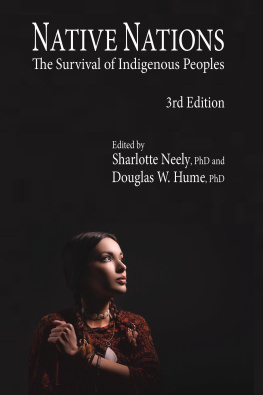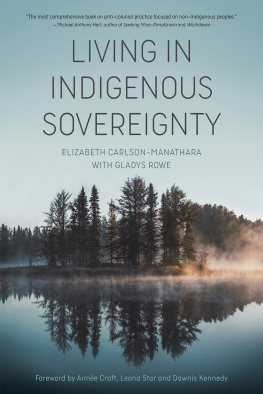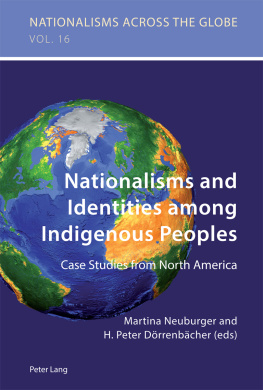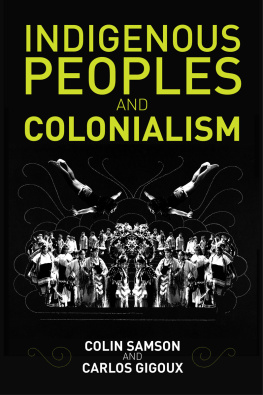INDIGENOUS PEOPLES
AND GLOBALIZATION
INDIGENOUS PEOPLES
AND GLOBALIZATION
RESISTANCE AND REVITALIZATION
Thomas D. Hall
and
James V. Fenelon
First published 2009 by Paradigm Publishers
Published 2016 by Routledge
2 Park Square, Milton Park, Abingdon, Oxon OX14 4RN
711 Third Avenue, New York, NY 10017, USA
Routledge is an imprint of the Taylor & Francis Group, an informa business
Copyright 2009, Taylor & Francis.
All rights reserved. No part of this book may be reprinted or reproduced or utilised in any form or by any electronic, mechanical, or other means, now known or hereafter invented, including photocopying and recording, or in any information storage or retrieval system, without permission in writing from the publishers.
Notice:
Product or corporate names may be trademarks or registered trademarks, and are used only for identification and explanation without intent to infringe.
Library of Congress Cataloging-in-Publication Data
Hall, Thomas D., 1946
Indigenous peoples and globalization : resistance and revitalization / Thomas D. Hall and James V. Fenelon.
p. cm.
Includes bibliographical references and index.
ISBN 978-1-59451-657-3 (hardcover : alk. paper)
ISBN 978-1-59451-658-0 (paperback : alk. paper)
1. Indigenous peoplesPolitics and government. 2. Indigenous peoplesLand tenure. 3. Indigenous peoplesSocial conditions. 4. GlobalizationPolitical aspects. 5. Culture and globalization. I. Fenelon, James V. II. Title.
JF1061.H35 2009
305.8dc22
2009000979
ISBN 13: 978-1-59451-657-3 (hbk)
ISBN 13: 978-1-59451-658-0 (pbk)
Designed and Typeset by Straight Creek Bookmakers.
To our fathers who passed on to the spirit world, Vincent E. Fenelon and Harry T. Hall, and to all indigenous peoples who remember and survive.

Contents
G LOBALIZATION THEORY HAS MADE a considerable impact on understanding Western history and the development of contemporary capitalism. Some experts have taken the argument of globalization and addressed more local world-systems in differing historical periods and local microcosms of trade and economic exchange. Generally the arguments of globalization and world-systems have focused on the rise of capitalism and its global reach and effects on core, semiperipheral, and peripheral economies and peoples. Globalization research tends to look at market systems, or nation-states, sometimes old civilizations, and the impact of emerging and extending global or regional market or trade relations.
In the social sciences, relatively little attention is given to the historical and contemporary conditions of indigenous peoples. Modernization, and generally most contemporary theoretical viewpoints, and Eurocentric histories often saw indigenous peoples on the far periphery and doomed for destruction in the face of advancing market systems and nation-states. The continued persistence and continuity of indigenous peoples throughout the world have defied such theoretical viewpoints as too simplistic and not broad enough to account for the contemporary world, where indigenous peoples around the world refuse to disappear according to theoretical predictions. Contemporary theories need to reconcile with the empirical counterpoint that indigenous peoples will continue as social, cultural, and political peoples in the contemporary world and into the future. Any theory that predicts the cultural, political, and economic disappearance of indigenous peoples will need to revise its basic assumptions and provide an accounting of the continuity of indigenous peoples, societies, cultures, and nations.
According to the United Nations, there are at least 375 million indigenous people in the world. These peoples have for many years worked in international diplomatic channels and are organized into numerous internationally recognized nongovernmental organizations; they also are recognized within the United Nations as the UN Permanent Forum on Indigenous Issues. After centuries of silent resistance and continuity, indigenous peoples have found more visible voices in the contemporary international context of human rights established as a reaction to the Nazi horrors of World War II. Indigenous peoples are composed of thousands of languages, cultures, social and political histories, and conditions. The experiences and histories of indigenous peoples vary by international political relations, local and world globalization, the features of and relations to their surrounding nation-states, as well as their own diverse social, cultural, and political organization and histories.
Most contemporary theory does not conceptualize the existence or presence of indigenous peoples, let alone offer a theory or conceptualization of the cultural, political, social, and territorial continuity of contemporary indigenous peoples and nations. Truly powerful and ecumenical theories of social change must account systematically for the inclusion of indigenous peoples and their experiences in history, present-day life, and in the future. Any theory of social change or society that cannot include the fundamental issues of indigenous peoples must be considered incompletenot fully capable of explaining or even describing the range of human experience, history, or processes of change. Contemporary theory should not, and cannot, continue to reflect the interpretations of colonial or even modernization positions that abstract past the continued presence of indigenous peoples and their ways of life. The need to include indigenous peoples in contemporary theory is not a claim on rights or a mode of civil rights inclusion, but rather the beginning of theories that provide more complete understanding and explanatory range about the diversity of human societies and their histories and cultures. Any future understanding of human groups must include the full range of human experience, and not systematically exclude some human groups based on beliefs and understandings that the world is moving toward a singular view of the good life, of the good society, or the most appropriate culture. Our theories need to understand diversity of historical experience, patterns of change, multiple cultural and community paths to the future, and in the end provide some semblance of explanation or understanding of the patterns of human experience and future possibilities.
This book makes a significant step in developing a theory and perspective that provides greater appreciation of the diversity and possibilities of human societies and peoples. Hall and Fenelon take the tradition of globalization theory while adapting it to provide greater understanding of indigenous peoples in historical and contemporary contexts. The major goal of the work is to make an argument that globalization is a significant context for understanding social, cultural, and political action in indigenous communities. The actions of indigenous communities are conditioned by the position and changing relations of globalization. The authors propose several patterns of change and use case studies to illustrate their arguments. The work is original in the sense that research on world-systems and their effects on indigenous nations is relatively spare. Hall is a major contributor to the world-system and indigenous peoples literature. The current book extends the theory and empirical range of the existing literature on globalization and its effects and patterns of resistance or accommodation among indigenous peoples around the world. The book builds on earlier works by the authors, and it proposes new hypotheses and empirical case studies about the global political, economic, and cultural effects on indigenous social and political processes. The contributions are plausible, and they reveal the need for more empirical work and theorizing. The authors include case studies to illustrate points and theories, although they are quick to temporize about both the empirical case material and the theory. The book is a good example of applying globalization theory to analyze indigenous patterns of resistance and change; it should be useful to many scholars, as well as extending world-systems analysis into areas where it has made limited theoretical and empirical headway.


